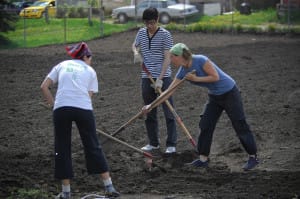The Call of the Land
by Steven McFadden
 |
Agrarians often remark in one context or another that they feel farming went off course when people started trying to run farms as a business instead of as a way of life. At that point they say farming was no longer a culture of the land, but rather a business of the land — a business that has metastasized over decades to become the modern, chemically-fueled behemoth of industrial agribusiness.
Community Supported Agriculture (CSA) has been planted, germinated, and cultivated in the context of the increasing dominance of industrial agriculture and the ongoing decline of the traditional family farm. Over the last 28 years many thousands of people have recognized in CSA a vehicle for approaching food, land, environment and community in a different way. But there is a creeping risk that CSA could be diverted down a course more devotedly focused on monetary profit and business efficiency in service to profit. In so doing the movement risks losing its bearings on the matters of agricultural, social and environmental renewal that were intrinsic to the original concept.
Increasingly over the last decade, as more and more businesses have seen a marketing opportunity and begun to describe themselves as CSAs, extension services and educators have also advanced the idea of CSA as a “marketing approach” or “marketing tool.” Yet an emphasis on marketing is in many respects the antithesis of what CSA started out to become, and what it still has the potential to become. CSA was not initiated as a way to sell food. It was about communities of people directly supporting specific farms, and in reciprocity farms directly supporting specific people in specific communities.
Many agricultural initiatives claiming the status of CSA do in fact approach it as simply a marketing strategy — just another way for a farm to sell vegetables and to earn money. Such initiatives fill a true need, no doubt. But they veer from the core ideas of CSA, ideas which are eminently worthy of recollection. In my view, the agricultural, environmental, social and health ideals are still very much worth striving for.
When a “CSA” puts its central focus on profit, by that very act it modifies or mutates the spirit of the movement and fundamentally becomes something else – ‘Genetically Modified CSA,’ you might say. That something else may be a fabulous business idea that is doing an effective job of fulfilling a real need for consumers. That’s admirable. But the business is not a CSA, and the use of CSA as a descriptor for such businesses undermines the efforts of true community supported farms.
Profit-centered enterprises have over time eroded the integrity of the term “natural” so that it has little relevant meaning in the marketplace. No one trusts the label “natural” anymore because it can mean anything the labeler wants it to mean. Likewise, the meaning of words like “green” and “sustainable” has mutated over the decades. Those terms have been deliberately compromised to cover an ever-widening range of ideas and tools, and in some cases the terms have been distorted to describe extreme industrial technological “solutions” for environmental problems, such as adding chemicals to the ocean to control pollution, or salting the atmosphere with microscopic metal particles in an attempt to prevent global climate change
Similarly, the term ‘CSA” may have its definition eroded. As Angelic Organics CSA farmer John Peterson told me last year, “A farm is not just an economic unit to produce food. It’s also a living social, environmental and educational organism…
“A CSA cannot be thought of as just a unit of economic production. That just commodifies the farms and farmers, as food is commodified also…You can’t have farmers beat in to the ground working for prices set by wholesalers, trying to make mortgage and equipments payments and all the rest. You cannot have the stewards of the land struggling under that much pressure.”

